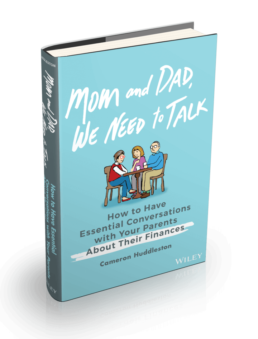Research shows that teaching your kids about money provides all sorts of benefits, including better financial decision-making skills in adulthood and lifelong savings habits.
However, it also can open the door to questions from your kids about your family’s finances: How much money do you make? Are we rich? Are we poor? Mom and Dad, are you saving for retirement, or am I going to have to support you? (OK, so your 8-year-old probably won’t ask that, but your 28-year-old might.)
Suddenly, talking openly about money might not seem like such a great idea. It’s one thing to discuss financial concepts with your children. It’s another thing altogether to reveal your income, your debt, your savings … Or, is it?
As the author of a book about talking to parents about their finances, I’m an advocate for openness. My husband and I have shared all sorts of information with our three children because we believe that it benefits both them and us.
We’re not alone in our willingness to discuss what many families might consider taboo. Other financial experts agree that it’s important to have open money conversations with children. The key is determining what to tell your kids and when.
“How much you choose to share as they grow involves personal preferences, family dynamics and, of course, your cultural background,” says John Lanza, author of The Art of Allowance. That said, these suggestions can help guide the financial conversations you have with your children from the time they are young until they are adults.
What to share with elementary-age children
You don’t need to pull up your budgeting spreadsheet and go line by line with your 5-year-old. But it’s a good idea to give young children insight into why you work and where your money goes. You also can let them start participating in family money decisions once they have basic math skills.
For example, after introducing the idea that you work to earn money, you can help young children understand how you make choices about spending your money by taking them grocery shopping with you. You could create a list of items and a budget, then work with your kids to get everything on the list and compare prices to stick within a budget. “We can also extend the conversation by discussing differences across families—some must get by on much lower budgets, and others may not pay much attention to smart shopping,” Lanza says.
If you give to charities or your place of worship, you can let your young children participate in family donations to help them understand that part of what you earn is used to help others, Lanza says. Just don’t underestimate their math abilities if you donate a specific percentage of your income but aren’t comfortable with them knowing your total income, he says. Your kids are often more perceptive than you think.
Young children also are ready for more mature conversations sooner than you think. Because they can pick up on financial stress, it’s better to assume they know something is wrong rather than try to shield them from financial setbacks your family might be facing. Lanza recommends that you reassure your children that you’re working on a solution and consider enlisting their help in reducing expenses. “Making it a team effort can help them feel more in control and less worried,” he says.
The key is to start having conversations while your children are young to pave the way for more in-depth discussions as they get older.
What to share with pre-teens
As your kids become more perceptive about your financial situation and their financial standing compared with peers, they’ll likely start demanding more information. Andy Hill, the father of two and host of the Marriage Kids and Money podcast, has seen this first-hand with his pre-teens. In response to his kids’ questions, Hill and his wife have been open about their financial situation.
“They are now aware of how much we make, the fact that we choose to live debt free and our general net worth,” Hill says. “Through this openness, our kids ask additional questions that help them learn how to create a strong financial foundation for themselves.”
If you’re not prepared to share that level of detail, you should at least be ready to respond to comments from your pre-teens about what their classmates have, followed by questions about whether they, too, can have those things, participate in the same activities or take similar trips.
When asked those sorts of questions, I told my children that there would always be other families that had more money than us and those that had less. I then used the opportunity to discuss why we spent our money on some things and not others. For example, I often told my kids when they were pre-teens that our family enjoyed traveling, so we would rather spend money on trips than buying a lot of things.
Pre-teens can benefit from conversations about your family’s financial values and goals. They’re capable at this age of grasping the deeper nature of these discussions. And it will prepare them to better understand decisions that will greatly impact them in coming years, such as whether your family can afford to send them to college or trade school.
What to share with high school and college-age children
Even if you haven’t shared many details with your children by the time they reach high school, they have a good sense of where your family stands financially. So if they hope to attend college, they likely want to know what sort of financial support they can expect from you.
From my experience, it’s important to have this conversation when your kids start high school—not in their senior year. They need to know what you can afford so they can plan accordingly. For example, they might want to get an after-school job and work during summers to start saving, take dual-credit courses to rack up some college credits while in high school, or start positioning themselves to win scholarships.
As your children become young adults, consider sharing details of your retirement planning, estate planning and long-term care planning—especially if you’re counting on them to play any sort of role in your financial life as you age.
For example, my husband and I updated our will and other estate planning documents this year and named our oldest daughter, who is 20, our alternate executor, power of attorney and health care surrogate in case neither of us can fill those roles for each other. So we shared details about the financial resources that would be available to her and her siblings: how much life insurance we have and balances in our retirement and investment accounts.
She knows where our estate planning and financial documents are located. And I plan to create a detailed list of all of our financial accounts that I will share with her and my 18-year-old daughter when they are both home from college during winter break. I want to make it as transparent as possible for them if something were to happen to me and my husband.
What to tell your adult children
As I write in my book, Mom and Dad, We Need to Talk, adult children should try to gather as many details about their parents’ finances as possible. Naturally, I believe that parents should be willing to provide those details.
You should share your sources of income, your retirement plans, whether you have debt, what sort of long-term care you would want and how you would pay for it (or have to rely on family for care), and your estate plan and final wishes. Details such as monthly bills, account log-in credentials, names of financial and legal professionals you work with also are important. The more you’re willing to share, the better.
Your children will need this information if a health issue forces them to get involved with your finances. They will need this information to prepare their own finances if they have to help care for or support you. They will need this information to settle your estate when you die.
At the least, share general information to give them a sense of where you stand financially and what sort of support they might have to provide. And let them know how you want your finances managed if you are unable to yourself.
If you don’t want to provide account balances or hand over usernames and passwords, create a list of assets, bills, financial accounts, and usernames and passwords. Store the list somewhere safe, and tell your children when and how they can access it. That way, they will have access to that information when they need it most.
Bottom line
Sharing details about your finances with your children doesn’t have to be awkward. It allows you to share your financial values and explain how spending decisions are made in your family. This, in turn, will help your children become financially responsible adults. And, if you ever need help with your finances as you age, your children will be armed with the information they need to manage your money the way you would want.
Don't Miss Out! ORDER NOW!
"An excellent step-by-step guide to navigate what can be time-consuming, uncomfortable conversations."
- Michelle Singletary, The Washington Post
Related Posts
April 28, 2019
My Biggest Money Regret: Not Talking to My Mom Soon Enough About Her Finances
I learned the hard way that family…

Cameron Huddleston
I am the author of Mom and Dad, We Need to Talk: How to Have Essential Conversations With Your Parents About Their Finances. I also am an award-winning journalist with 20 years of experience writing about personal finance. My work has appeared in Kiplinger’s Personal Finance, Forbes.com, Yahoo!, MSN, and other online and print publications.





[…] How Much Should You Tell Your Kids About Your Finances? [Cameron Huddleston] – “Research shows that teaching your kids about money provides all sorts of benefits, including better financial decision-making skills in adulthood and lifelong savings habits. […]
I agree that it is REALLY important to share varying degrees of information with your kids based on their age. How else will they learn if you don’t help push them along?
Figuring out how much to tell them and when is hard, and with elementary-age kids, we are doing our best to teach them about money on their own time when they are ready. My oldest just opened up a bank account and is running a small side business he created rather on an accident.
And as they get older, they’ll learn more about budgeting, retirement planning, etc. I also have a list of books that I will give them to read as they get to the appropriate age. A well timed book can do wonders!
[…] How much should you tell your kids about your finances? (Cameron Huddleston). We’ve erred on the “share more” side of this equation, but keeping things age-appropriate is important. […]
[…] How to share details with your kids about your finances. Cameron Huddleston […]
[…] your teenager know your salary? What about your eight-year-old? Cameron explores this topic in her latest blog post, and she invited Andy Hill (another previous podcast guest) and me to weigh […]
[…] Art of Allowance Podcast alum Cameron Huddleston tapped me to contribute to her new post, “How Much Should You Tell Your Kids About Your Finances?“ […]
[…] Reference: Cameron Huddleston (Oct. 29, 2024) “How Much Should You Tell Your Kids About Your Finances?” […]